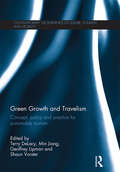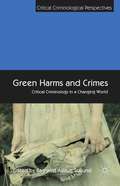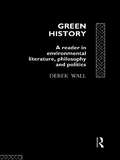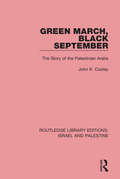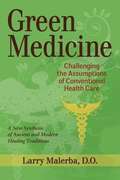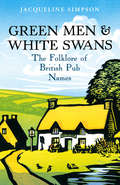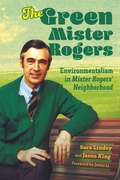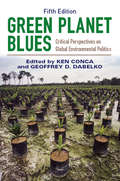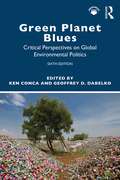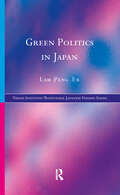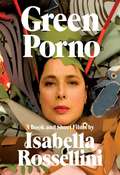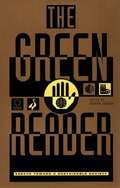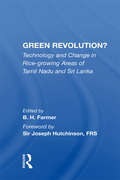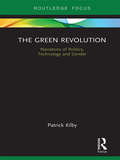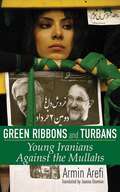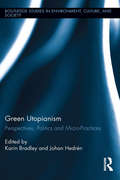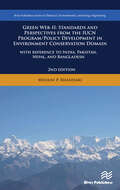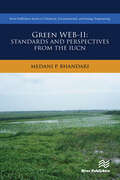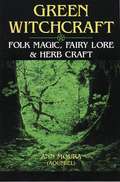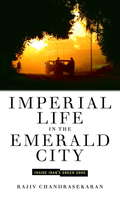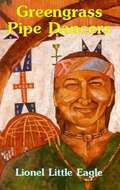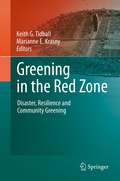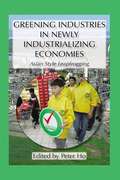- Table View
- List View
Green Growth and Travelism: Concept, Policy and Practice for Sustainable Tourism (Contemporary Geographies of Leisure, Tourism and Mobility)
by Terry DeLacy Min Jiang Geoffrey Lipman Shaun VorsterThe green growth paradigm emerged from evolving global strategies that coherently promote a more socially inclusive, low-carbon, resource-efficient, stable economy, with decreasing poverty. Opportunities and challenges associated with the paradigm shift are expected to transform the travel and tourism (travelism) sector in all respects and on a global scale. This involves the transformation of the entire travelism value chain, as well as the communities in tourism destinations. However, there is a lack of systematic reports on wide-ranging and complex implications of the green growth paradigm for the travelism sector. This book focuses on the twin pillars – green growth and travelism – as key building blocks in exploring an essential multi-decade lifestyle change for planetary and human well-being, through the lenses of concept, policy and practice. It provides a conceptual discussion of the implications of the new development trend for key players in the travelism system, offers case studies from both developed and developing countries that highlight key issues in the transformation towards the green economy, and explores the policy settings and frameworks on both the global and national levels that underpin travelism green growth. This book offers tourism industry players, academics, students, policy makers and practitioners a comprehensive discussion of the latest progress in green growth and travelism.
Green Harms and Crimes
by Ragnhild Aslaug SollundThe book presents discussions of the application of Stan Cohen's theories alongside empirical contributions in the fields of critical and green criminology. Taken together, the authors critically address harms and crimes against the environment, as well as against human and nonhuman victims.
Green History: A Reader in Environmental Literature, Philosophy and Politics
by Derek WallGreen History traces the development of ecological writing through history and forms a broad critical review of green ideas and movements reinforcing the importance of environmental concern and action in our own time. Animal rights, ecology as science, feminism, green fascism/socialism/anarchism, land reform, peaceful protest, industrialization, ancient ecology, evolution, grassroots activism, philosophical holism, recycling, Taoism, demographics, utopias, sustainability, spiritualism ...all these issues and many more are discussed. Authors include Alice Walker on massacre in the City of Brotherly Love, Aldous Huxley on progress, Lewis Mumford on the organic outlook, Engels on natural dialectics, Thoreau on the fontier life, the Shelleys on vegetarianism and playing God, Bacon on the New Atlantis, Hildegard of Bingen on green vigour, the unknown writer of the Bodhisattva and the Hungry Tigress and Plato on soil erosion. Each article is set within its historical and thematic context. A full introduction and a guide to further reading are also provided.
Green March, Black September: The Story of the Palestinian Arabs (Routledge Library Editions: Israel and Palestine #4)
by John K. CooleyIn March 1968 Palestinian guerrillas and Jordanian troops combined forces to respond to Israeli raids into Jordan, provoking visions of new unity and future military success. Yet by September 1970 mounting friction between the Palestinian guerrillas in Jordan and King Hussein’s regime came to a head with the hijackings at Dawson’s Field and the defeat by Jordan’s forces of the Palestinians. The savagery of the fighting and the bitter consequences for the Palestinian guerrillas gave this month the name Black September: a name that was to reappear ominously in months to come. Who are the Palestinians? Many people only became aware of their existence because of terrorism, particularly the Black September operation at the Munich Olympics. Yet the Palestinians are at the very heart of the Middle East problem, and this book, first published in 1973, tells their story. The core of the book describes the emergence of the various guerrilla groups, joined by Palestinians hopeful of regaining lost land and lost dignity, and the ideologies and differences of the groups. There are personal interviews with some of the main leaders, and other chapters examine the relationships and interaction between the Palestinian groups and the Soviet bloc, the Chinese, the Third World, the West, and most important, the Israelis themselves.
Green Medicine
by Larry MalerbaAccording to Dr. Larry Malerba, modern medicine has perfected the short-term technical repair of the physical body at the expense of the long-term psychological and spiritual well-being of the whole person. In Green Medicine he examines this issue and provides a realistic blueprint for wellness and a valuable guide for those seeking deeper and more lasting healing. Written in an accessible style, the book draws on a rich range of fields--physics, philosophy, Jungian thought, shamanism, alchemy, Eastern thought, Western esotericism, sustainability, orthodox medicine--to create a green medical paradigm that represents a powerful integrative medical perspective.Dr. Malerba interweaves case histories from his own practice with innovative concepts from alternative and Western medicine in order to address a number of crucial questions: * What are the personal and environmental costs to the overuse of pharmaceutical drugs?* Is conventional medicine as scientific as it claims to be?* How can conventional doctors and alternative healers begin to work together? * How can individuals transform medicine and become participants in their own healthcare? Green Medicine offers a practical and philosophical basis for building a viable green alternative that draws on the inherent unity of body, heart, mind, soul, and nature.From the Trade Paperback edition.
Green Men & White Swans: The Folklore of British Pub Names
by Jacqueline SimpsonWhy do British pubs have such curious names? What tales lie behind the Moonrakers, the Hooden Horse, the Derby Tup? And why does the Green Man come in different shapes and sizes?In Green Men & White Swans, leading folklorist Jacqueline Simpson explores the fascinating stories behind pub names, uncovering the myths and legends, euphemisms and wordplays, heroes and even ghosts that have inspired pub landlords over the centuries. Spanning beloved locals from the Three Witches to the Three Nuns, from the Ashen Faggot to the Twa Corbies, this book is both an intriguing insight into the history of the British pub and a captivating journey through the country's dramatic past.
The Green Mister Rogers: Environmentalism in Mister Rogers' Neighborhood (Children's Literature Association Series)
by Sara Lindey Jason KingFred Rogers was an international celebrity. He was a pioneer in children’s television, an advocate for families, and a multimedia artist and performer. He wrote the television scripts and music, performed puppetry, sang, hosted, and directed Mister Rogers’ Neighborhood for more than thirty years. In his almost nine hundred episodes, Rogers pursued dramatic topics: divorce, death, war, sibling rivalry, disabilities, racism. Rogers’ direct, slow, gentle, and empathic approach is supported by his superior emotional strength, his intellectual and creative courage, and his joyful spiritual confidence. The Green Mister Rogers: Environmentalism in “Mister Rogers’ Neighborhood” centers on the show’s environmentalism, primarily expressed through his themed week “Caring for the Environment,” produced in 1990 in coordination with the twentieth anniversary of Earth Day. Unfolding against a trash catastrophe in the Neighborhood of Make-Believe, Rogers advances an environmentalism for children that secures children in their family homes while extending their perspective to faraway places, from the local recycling center to Florida’s coral reef. Rogers depicts animal wisdom and uses puppets to voice anxiety and hope and shows an interconnected world where each part of creation is valued, and love is circulated in networks of care. Ultimately, Rogers cultivates a practical wisdom that provides a way for children to confront the environmental crisis through action and hope and, in doing so, develop into adults who possess greater care for the environment and a capacious imagination for solving the ecological problems we face.
Green Planet Blues: Critical Perspectives on Global Environmental Politics (5th Edition)
by Ken Conca Geoffrey D. Dabelko<p>Revised and updated throughout, this unique anthology examines global environmental politics from a range of perspectives (contemporary and classic, activist and scholarly) and reflects voices of the powerless and powerful. Paradigms of sustainability, environmental security, and ecological justice illustrate the many ways environmental problems and their solutions are framed in contemporary international debates about climate, water, forests, toxics, energy, food, biodiversity, and other environmental challenges of the twenty-first century. Organized thematically, the selections offer a truly global scope. Seventeen new readings discuss climate justice, environmental peacebuilding, globalization, land grabs, corporate environmentalism, climate adaptation, gender, disaster risk, resilience, and the future of global environmental politics in the wake of the 'Rio+20' global summit of 2012. <p>This book stresses the underlying questions of power, interests, authority, and legitimacy that shape environmental debates, and it provides readers with a global range of perspectives on the critical challenges facing the planet and its people.</p>
Green Planet Blues: Critical Perspectives on Global Environmental Politics
by Ken Conca Geoffrey D. DabelkoRevised and updated throughout, this unique anthology examines global environmental politics from a range of perspectives and captures the voices of both the powerless and the powerful. Paradigms of sustainability, environmental security, and ecological justice illustrate the many ways environmental challenges and their solutions are framed in contemporary international debates about climate, water, forests, toxics, energy, food, and biodiversity. Organized thematically, the selections offer a truly global scope. Seventeen new readings explore climate justice, globalization, land and water grabs, climate change and conflict, China’s international environmental relations, and the future of climate politics in the wake of the Paris Agreement. This book stresses the underlying questions of power, interests, authority, and legitimacy that shape environmental debates, and it provides readers with a global range of perspectives on the critical challenges facing the planet and its people. This new edition of Green Planet Blues connects directly with a wide-range of upper-level undergraduate and graduate-level courses.
Green Politics in Japan (Nissan Institute/Routledge Japanese Studies #10)
by Lam Peng-ErAn important comparative study of Japanese politics that reveals that green issues have yet to displace the traditional urban politics of post-industrial Japan. This is unlike the rise of green parties and politics in Europe. Unlike Europe, it seems that political values in Japan are still informed by the conservative values of hierarchy and deference.
Green Porno
by Isabella RosselliniDeep down in the ocean, strange things happen, acts of love that are unfamiliar to the human eye: Anchovies mate in large orgies; shrimp strip down to get in the mood; starfish can do it two different ways; whales fight to make love. Inspired by the wonderfully odd and humorous short films created by Isabella Rossellini and released on DVD for the first time, Green Porno offers a visually arresting and scientifically accurate look at the sex lives of marine animals and other creatures. This book will make you see the animal kingdom as you never have before.
The Green Reader: Essays Toward a Sustainable Society
by Andrew DobsonThe Green Reader collects key source documents of today's most important social/scientific/philosophical movement-the Green movement.
Green Retreats
by Stephen BendingGreen Retreats presents a lively and beautifully illustrated account of eighteenth-century women in their gardens, in the context of the larger history of their retirement from the world whether willed or enforced and of their engagement with the literature of gardening. Beginning with a survey of cultural representations of the woman in the garden, Stephen Bending goes on to tell the stories, through their letters, diaries and journals, of some extraordinary eighteenth-century women including Elizabeth Montagu and the Bluestocking circle, the gardening neighbors Lady Caroline Holland and Lady Mary Coke, and Henrietta Knight, Lady Luxborough, renowned for her scandalous withdrawal from the social world. The emphasis on how gardens were used, as well as designed, allows the reader to rethink the place of women in the eighteenth century, and understand what was at stake for those who stepped beyond the flower garden and created their own landscapes.
Green Revolution?: Technology And Change In Rice-growing Areas Of Tamil Nadu And Sri Lanka (Cambridge Commonwealth Ser.)
by B. H. Farmer Joseph HutchinsonAs will be made clear in the pages that follow, this book is based on a field research project focused on rice-growing and undertaken in parts of North Arcot District in Tamil Nadu (India) and of Hambantota and Mon-eragala Districts, Sri Lanka. We use 'S.E. Sri Lanka' as shorthand for the whole of the latter study area, and 'Hambantota District' for the part of it which falls in that District. Except where the context requires otherwise, the present in our book refers to 1973-4; while 'Randam' and 'Paha-lagama' are fictitious names for real villages. The project was an inter-disciplinary one, involving workers qualified in economics, geography, hydrology, sociology, statistics and the study of the administration of development.
The Green Revolution: Narratives of Politics, Technology and Gender (Earthscan Food and Agriculture)
by Patrick KilbyThis book reviews the Green Revolution, starting with its inception and development from the 1940s to the 1970s, and leading to what is commonly referred to as a second Green Revolution in the 2000s. Building on the historical assessment, it draws insights for contemporary policy debates and demonstrates important lessons for the here and now. ‘Green Revolution’ refers to the technical measures employed to increase food (particularly grain) production, based mainly on improved seed varieties for higher yields and pest resistance. For it to be successful the Green Revolution often required land reform, investments in irrigation and fertilizer supply that were not available to women and marginal farmers. This book analyses three underlying principles that have guided green revolutions: the political environment in which they were set; how they contributed to both the successes and challenges the Green Revolution continues to face; and the systemic institutional barriers for access to these agricultural production advances, with a focus on how gender relations limit the inclusion of women even when they are the principle cultivators and farm managers. The book draws on experiences in Mexico, India and China, examining government policy, the role of the family farm, and key issues around the inclusion of women. In doing so, this book connects the history of the Green Revolution with contemporary policy debates on the developing world, particularly in relation to Africa and Asia, around foreign aid and agricultural research. It also specifically establishes that greater inclusivity for women and other marginalised farming communities will significantly enhance the effectiveness of these programs. Interlinking themes of development policy, gender, and agricultural research, this book will be of great interest to students and scholars of agricultural development, food security, and sustainable development, as well as policymakers and practitioners working in international aid and agri-food policies.
Green Ribbons and Turbans: Young Iranians Against the Mullahs
by Armin Arefi Joanna OsemanDuring the last presidential election in Iran, nonviolent protestors defied the mullahs' power by wearing green ribbons on their wrists. In June of 2009, the inhabitants of Tehran were living underground to escape the government's authority, strangled by interdictions, dreaming of freedom and revolution. Mahmoud Ahmadinejad, president of the Islamic Republic of Iran and desperate to maintain his power, defeated his opponent, Mahmoud Mousavi, by massive electoral fraud. The resulting frustration and anger throughout the country sparked a gigantic wave of opposition. The Green Movement was born.In this timely, politically relevant, and unique account of life in Iran, Arefi takes us to a world removed from the usual cultural and political clichés about Iran and lets us hear the voices of a new generation of Iranians, who have never known anything but religious dictatorship and repression. He also tells the stories of the first victims of repression-Neda, Sohrab, and Taraneh.
Green Utopianism: Perspectives, Politics and Micro-Practices (Routledge Studies in Environment, Culture, and Society #2)
by Karin Bradley Johan HedrénUtopian thought and experimental approaches to societal organization have been rare in the last decades of planning and politics. Instead, there is a widespread belief in ecological modernization, that sustainable societies can be created within the frame of the current global capitalist world order by taking small steps such as eco-labeling, urban densification, and recycling. However, in the context of the current crisis in which resource depletion, climate change, uneven development, and economic instability are seen as interlinked, this belief is increasingly being questioned and alternative developmental paths sought. This collection demonstrates how utopian thought can be used in a contemporary context, as critique and in exploring desired futures. The book includes theoretical perspectives on changing global socio-environmental relationships and political struggles for alternative development paths, and analyzes micro-level practices in co-housing, alternative energy provision, use of green space, transportation, co-production of urban space, peer-to-peer production and consumption, and alternative economies. It contributes research perspectives on contemporary green utopian practices and strategies, combining theoretical and empirical analyses to spark discussions of possible futures.
Green Web-II: Standards and Perspectives from the IUCN Program / Policy Development in Environment Conservation Domain - with reference to India, Pakistan, Nepal, and Bangladesh
by Medani P. BhandariThis second edition of the book, “Green Web-II: Standards and Perspectives from the IUCN Program / Policy Development in Environment Conservation Domain- with reference to India, Pakistan, Nepal, and Bangladesh” investigates the IUCN’s role in global biodiversity conservation policy as well as in national program development in India, Pakistan, Nepal and Bangladesh. It explores how nature protection priorities and approaches are promoted or addressed by IUCN, and how environment conservation policies are created and maintained in states of South Asia with different capacities. It also evaluates IUCN's competency in biodiversity, climate change, nature conservation and environmental policy formulation at the global, regional and country levels.This book adds to our knowledge firstly by contributing to a small but growing body of work on the sociology of international organizations. International Governmental Organizations (IGOs), have previously been mainly the subject of political science. Secondly, it critically explores one of the largest and most active nature conservation organizations in the world. Thirdly, it also explores how IUCN actually goes about building protectoral programs with individual member nations. Finally, the research also shows the historical development of global institutions and IUCN’s activities with member nations in helping to define or redefine the concept of global governance. The outcomes of this research will also be beneficial for global collaboration, networking, and for the identification of common concerns among the many environmental and conservational organizations at the international and national level. In this broader sense, the research outcomes might be beneficial to constituencies of the global North as well as global South because of the nature and coverage of IUCN and its role in conservation policy formation. This effort may serve as a model for additional research on international organizations.Technical topics discussed in the book include: The Motivation for Environmental Conservation- How personal efforts make a difference The Role of International Environment Conservation Organizations The Political Economy of Organizations, Network theory, Institutional theory, Stakeholder theory, Governance theory Governance performance and Competitiveness Popularity indices Knowledge creation and diffusion Conservation commons
Green Web-II: Standards and Perspectives from the IUCN (River Publishers Series In Chemical, Environmental, And Energy Engineering Ser.)
by Medani P. BhandariIn dealing with the IUCN, one must bear in mind that there never has been, and undoubtedly never will be, any other organization even remotely resembling it. Its peculiarities, subtleties and complexities are sometimes mind-boggling (Nicholson 1990 in Holdgate 1999: ix). Green Web-II investigates IUCN's role in global biodiversity conservation policy as well as in national program development in India, Pakistan, Nepal and Bangladesh. It explores how nature protection priorities and approaches are promoted or addressed by IUCN, an international organization, and how environment conservation policies are created and maintained in states with different capacities of South Asia. It also evaluates IUCN's competency in bio-diversity, climate change, nature conservation and environmental policy formulation at global, regional and country level. This study is the first detailed scholarly study on the IUCN as an organization as well as on its efforts in biodiversity conservation. This book adds to our knowledge, firstly by contributing to a small but growing body of work on the sociology of international organizations. IOs, especially International Governmental Organizations (IGOs), have long been the subject of mostly political science. Secondly, it applies a fuller sociological imagination to the study of IOs by critically exploring one of the largest and most active nature conservation organizations in the world. Thirdly, it also explores how the IUCN actually goes about building protectoral programs with individual member nations. Additionally, the book explores the recent development of the green economy (GE) concepts into IUCN's program planning today. The green economy initiative applies a people-first approach. Although the concept is relatively new, this research explores the theoretical development of a green economy and illustrates how this theory is applied in IUCN's program planning to program implementation.
Green Witchcraft: Folk Magic, Fairy Lore, & Herb Craft
by Ann MouraLearn the basics of Witchcraft from a third-generation Witch raised in a family tradition. Positive, practical, and easy to use, Green Witchcraft brings together the best of both modern Wicca and the author's family heritage of herb craft and folk magic. Green Witchcraft explores the fundamentals of the Wiccan religion, providing magical training for the independent thinker. Step-by-step instructions on a wide variety of magical techniques as well as basic rules of conduct make this the ideal book to get you started. Green rituals for self-initiation, rites of passage, seasonal celebrations and activities provide an excellent foundation for your own magical tradition. Discover the fine art of spell-casting, the magical uses of herbs, divination with the tarot and more. Explore the Sabbats, Esbats, and other rituals attuned to the cycles of nature and the universal powers. Find out for yourself what this organic approach to Witchcraft is all about.
Green Zone: Imperial Life in the Emerald City
by Rajiv ChandrasekaranFrom inside a surreal bubble of pure Americana known as the Green Zone, the US-led Coalition Provisional Authority attempted to rule Iraq following the fall of Saddam Hussein's regime. Drawing on interviews and internal documents, Rajiv Chandrasekaran tells the memorable story of this ill-prepared attempt to build American democracy in a war-torn Middle Eastern country, detailing not only the risky disbanding of the Iraqi army and the ludicrous attempt to train the new police force, but absurdities such as the aide who based Baghdad's new traffic laws on those of the state of Maryland, downloaded from the net, and the twenty-four-year-old who had never worked in finance put in charge of revitalising Baghdad's stock exchange. Imperial Life in the Emerald City is American reportage at its best.
Greengrass Pipe Dancers: Crazy Horse's Pipe Bag and a Search for Healing
by Lionel Little EagleThe saga of Crazy Horse's pipe bag, given to Dr. Henry Alexander Brown by the Lakotas, is recounted through amazing stories of its often uncanny power and the rich legacy behind it.
Greening in the Red Zone: Disaster, Resilience and Community Greening
by Keith G. Tidball Marianne E. KrasnyCreation and access to green spaces promotes individual human health, especially in therapeutic contexts among those suffering traumatic events. But what of the role of access to green space and the act of creating and caring for such places in promoting social health and well-being? Greening in the Red Zone asserts that creation and access to green spaces confers resilience and recovery in systems disrupted by violent conflict or disaster. This edited volume provides evidence for this assertion through cases and examples. The contributors to this volume use a variety of research and policy frameworks to explore how creation and access to green spaces in extreme situations might contribute to resistance, recovery, and resilience of social-ecological systems.
Greening Industries
by HoFirst published in 2006. Routledge is an imprint of Taylor & Francis, an informa company.
The Greening of America
by Charles A. ReichThere is a revolution coming. It will not be like revolutions of the past. It will originate with the individual and the with culture, and it will change the political structure only as its final act. It will not require violence to succeed, and it cannot be successfully resisted by violence. This is the revolution of the new generation.
